Trailblazing women have considerably influenced Indian politics, breaking barriers and advocating for essential reforms. Notable figures include Indira Gandhi, India's first female Prime Minister, who shaped socio-economic policies and championed women's empowerment. Other pioneering leaders like Sucheta Kriplani and Mayawati have worked tirelessly for marginalized communities and social justice. Political parties have increasingly supported women leaders, promoting initiatives for gender equality. As the number of women in leadership roles grows, so does their impact on policy and community advocacy. Their journeys reveal resilience and transformative changes that continue to inspire future generations. Explore their stories for deeper insights.
Key Takeaways
- Indira Gandhi, as India's first female Prime Minister, pioneered policies that significantly impacted food self-sufficiency and women's roles in politics.
- Sucheta Kriplani became the first woman Chief Minister of Uttar Pradesh, paving the way for female leadership in Indian politics.
- Mamata Banerjee and Mayawati focused on marginalized communities, advocating for social justice and women's empowerment in their respective states.
- Legislative reforms and initiatives from parties like the Indian National Congress and BJP have promoted women's leadership and rights in various capacities.
Indira Gandhi's Legacy
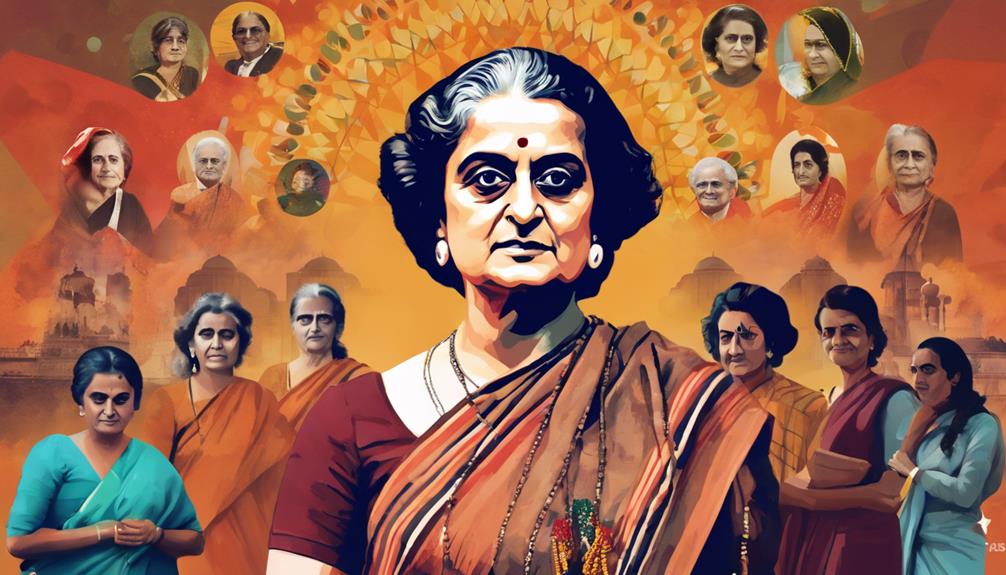
Indira Gandhi's legacy is marked by her transformative leadership and significant contributions to India's political landscape, particularly through her role in the Green Revolution and the 1971 Indo-Pak war.
As the first and only female Prime Minister of India, her authoritative style of governance saw the implementation of policies that led to substantial agricultural advancements, which transformed India into a self-sufficient food producer.
Additionally, her decisive leadership during the Indo-Pak war resulted in the creation of Bangladesh, highlighting her strategic political acumen.
Despite facing significant opposition, her tenure was characterized by a commitment to modernizing India, shaping the country's socio-economic framework.
Gandhi's influence remains a pivotal point in understanding the evolution of Indian politics and women's role within it.
Pioneering Women Leaders
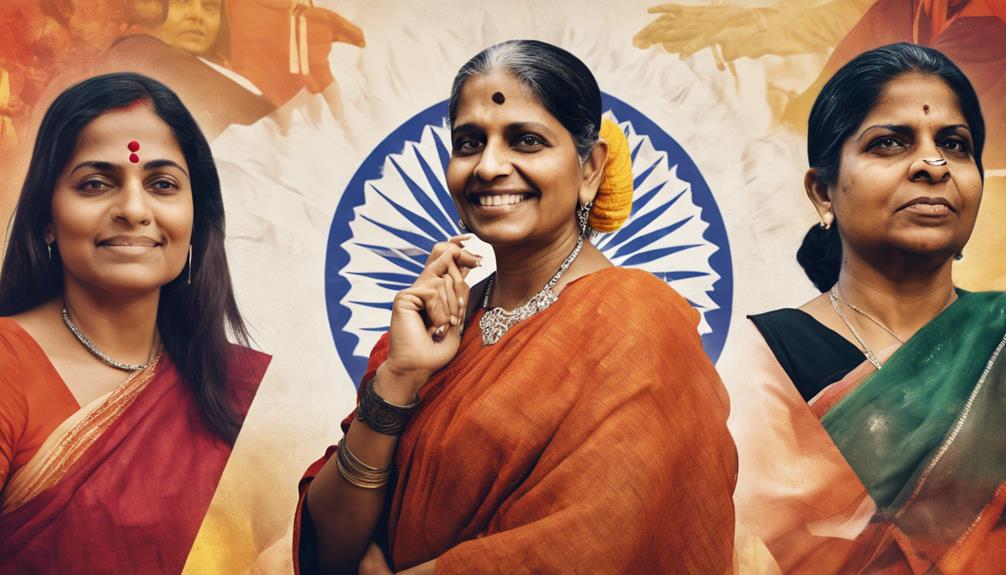
Pioneering women leaders in Indian politics have profoundly shaped the nation's governance and policy-making, breaking barriers and advocating for social justice and empowerment.
Figures such as Sucheta Kriplani, the first woman Chief Minister of Uttar Pradesh, and Nandini Satpathy, who championed education and women's rights in her role as Chief Minister of Odisha, exemplify this legacy.
Indira Gandhi's authoritative leadership and Pratibha Patil's focus on women's empowerment as President further underscore the impact of women in high political office.
Sonia Gandhi and Mamata Banerjee have also played significant roles, leading their respective parties and addressing the needs of marginalized communities.
These leaders have not only influenced policies but have also inspired future generations of women to engage actively in the political landscape.
Political Trailblazers in States
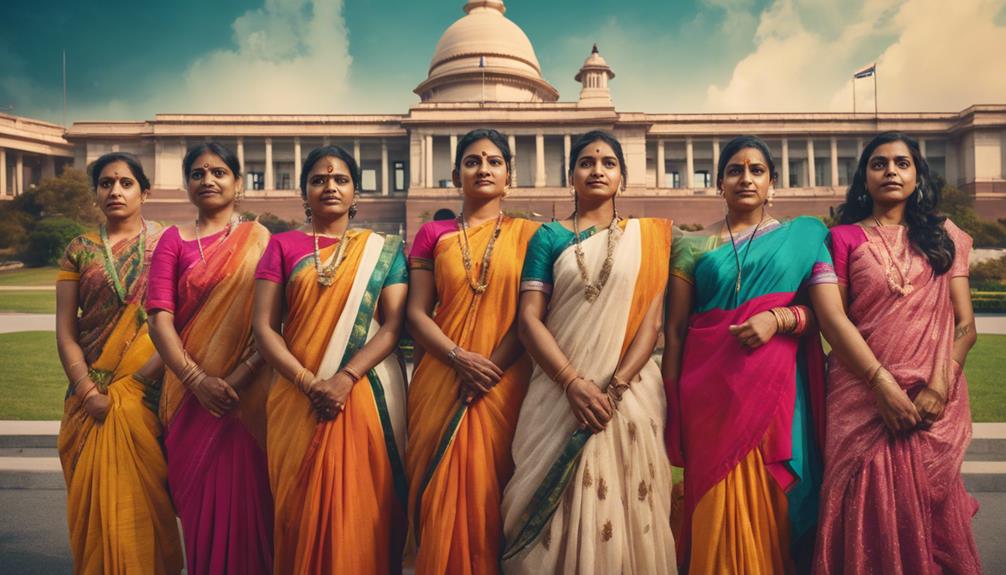
Several influential women have emerged as political trailblazers in various Indian states, each making significant contributions to governance and social reform. Their leadership has reshaped the political landscape and fostered greater inclusivity.
| Name | State | Contributions |
|---|---|---|
| Mamata Banerjee | West Bengal | Advocated for marginalized communities |
| Vasundhara Raje | Rajasthan | Focused on women's empowerment |
| Jayalalithaa | Tamil Nadu | Implemented welfare schemes |
| Mayawati | Uttar Pradesh | Promoted Dalit rights and social justice |
These women have not only held significant political positions but have also championed causes that resonate with the aspirations of their constituents, paving the way for future generations of female leaders.
Women's Empowerment Advocates
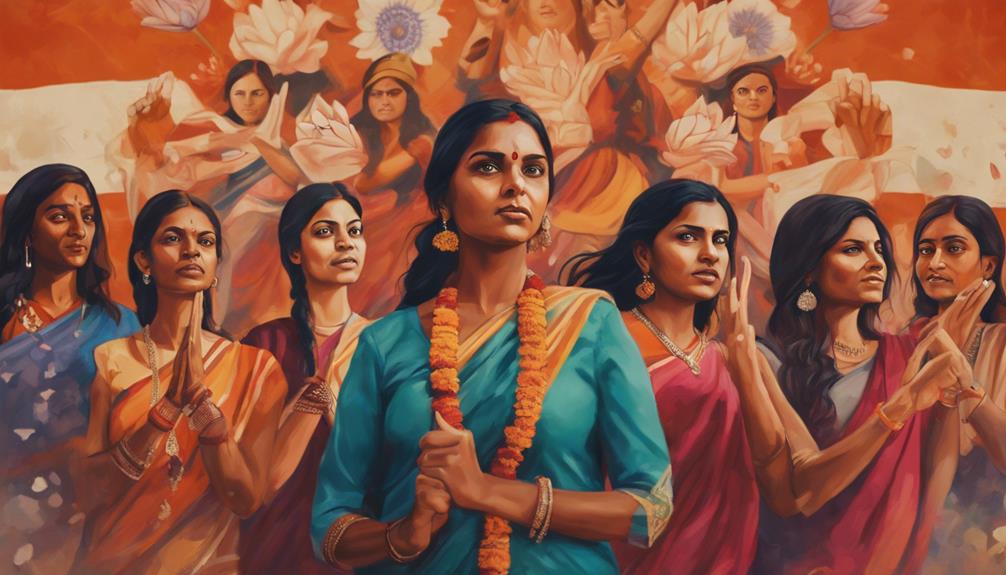
The commitment to women's empowerment is a defining characteristic of many prominent female leaders in Indian politics, who have consistently championed the rights and welfare of women throughout their careers. These advocates have made significant strides in creating policies and initiatives that uplift women in society.
Their contributions include:
- Legislative Reforms: Enacting laws that promote gender equality and protect women's rights.
- Economic Empowerment: Initiating programs that support women's entrepreneurship and financial independence.
- Education Initiatives: Fostering educational opportunities for girls to guarantee their access to quality learning.
- Advocacy and Awareness: Raising awareness about women's issues through grassroots campaigns and public discourse.
These efforts reflect a broader vision of an inclusive and equitable society, paving the way for future generations of women leaders.
Influential Political Parties
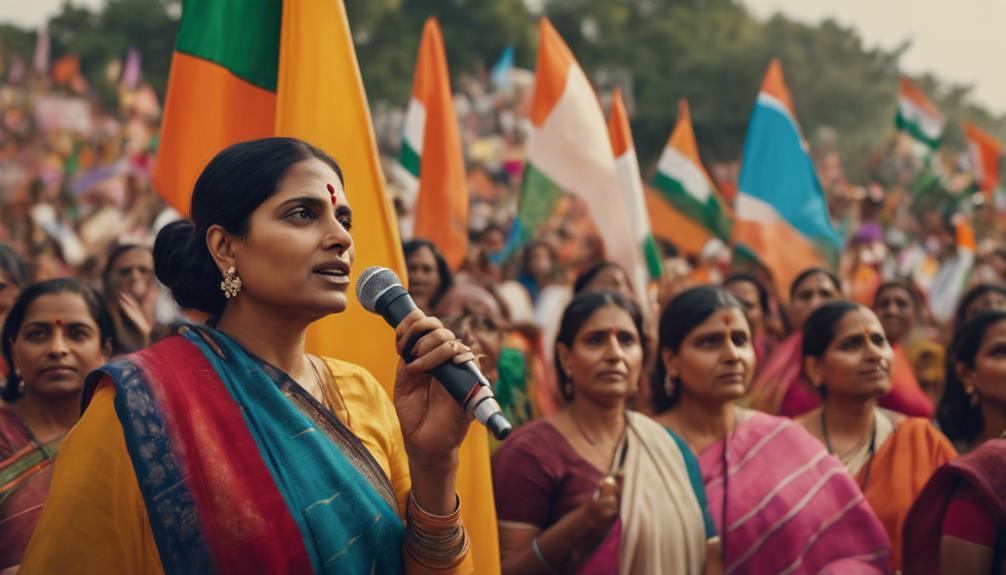
In the landscape of Indian politics, various influential political parties have played an essential role in shaping policies and governance, particularly concerning women's representation and empowerment.
The Indian National Congress has historically been pivotal, promoting women leaders like Sonia Gandhi and Sheila Dikshit, who have advocated for social justice and urban development.
The Bharatiya Janata Party (BJP) has also contributed notably, with leaders such as Vasundhara Raje Scindia focusing on women's welfare and economic growth.
Regional parties like Trinamool Congress, led by Mamata Banerjee, and the Bahujan Samaj Party, under Mayawati, have prioritized the rights of marginalized communities.
Collectively, these parties have advanced discussions on women's issues, influencing legislative measures and fostering greater political participation.
Challenges and Triumphs
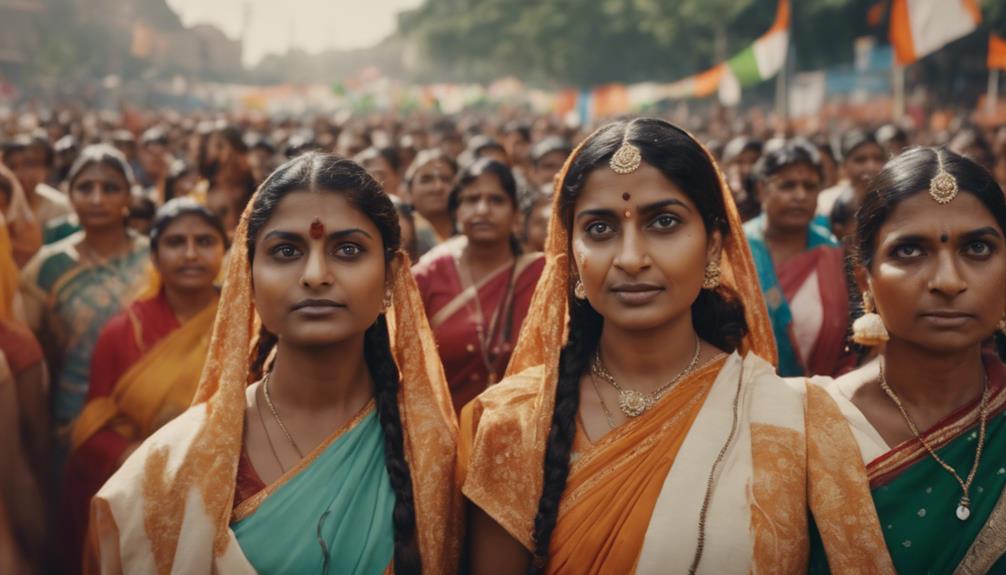
Steering through the complex landscape of Indian politics, women leaders have confronted numerous challenges while achieving significant triumphs in their pursuit of representation and empowerment.
Despite the barriers, these women have made remarkable strides, including:
- Breaking Stereotypes: Challenging traditional gender roles and societal norms.
- Leadership Positions: Attaining high offices such as Chief Minister and President, showcasing their capabilities.
- Legislative Influence: Advocating for laws and policies that promote women's rights and social justice.
- Mobilizing Communities: Engaging grassroots movements to empower marginalized groups and elevate women's voices.
These accomplishments reflect not only their resilience but also a transformative shift in the political landscape, paving the way for future generations of women leaders in India.
Impact on Social Justice

Women leaders in Indian politics have greatly influenced social justice, championing policies and initiatives that address the needs of marginalized communities and promote equality.
Figures such as Mayawati have prioritized Dalit rights, implementing welfare schemes that uplift disadvantaged groups. Similarly, Mamata Banerjee's governance in West Bengal has focused on the rights of marginalized populations, ensuring their voices are heard.
Leaders like Sonia Gandhi and Pratibha Patil have emphasized women's empowerment as a path to broader social equity. Their advocacy for education and rural development has profoundly impacted community welfare.
Collectively, these women have reshaped the political landscape, driving essential reforms that not only enhance social justice but also foster an inclusive society, underscoring the importance of representation in governance.
Future of Women in Politics

The future of female representation in Indian politics appears promising, with an increasing number of women entering leadership roles and influencing policy-making at various levels. This trend signals a shift toward enhanced gender parity in governance.
Key factors contributing to this positive trajectory include:
- Legislative Reforms: Initiatives aimed at reserving seats for women in local bodies are paving the way for greater participation.
- Education and Empowerment: Increased access to education empowers women to contest elections and engage in political discourse.
- Grassroots Movements: Women's organizations are mobilizing support, highlighting issues relevant to female constituents.
- Supportive Networks: Mentorship and networking opportunities are fostering a new generation of female leaders.
These developments illustrate a hopeful future for women in Indian politics.
What Traits of Trailblazing Women in Indian Politics Can Also Help Women Entrepreneurs Unlock Their Potential?
The key traits for entrepreneurs displayed by trailblazing women in Indian politics are resilience, determination, and adaptability. These qualities can also help women entrepreneurs unlock their potential in the business world. By facing challenges head-on and pivoting when necessary, women can make a significant impact in the entrepreneurial landscape.
What role do key traits for women entrepreneurs play in shaping Indian politics?
Key traits for entrepreneurs, such as resilience, innovation, and determination, play a crucial role in shaping Indian politics when exhibited by women. These qualities enable them to challenge the status quo, drive change, and advocate for policies that foster inclusive and sustainable economic growth and development.
Conclusion
The contributions of women in Indian politics have profoundly transformed the political landscape, fostering a climate where gender equality and social justice increasingly flourish.
Their enduring legacies resonate through the halls of power, inspiring future generations to aspire toward leadership roles.
While challenges remain, the unwavering pursuit of progress by these trailblazers heralds a promising horizon for women's representation.
This evolving narrative underscores the imperative of continued advocacy for equitable participation, ensuring that the voices of women are not merely heard but celebrated.









